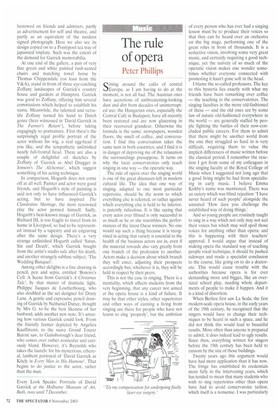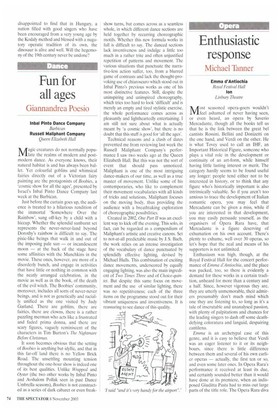The rule of opera
Peter Phillips
Sitting around the cafés of central Europe, as I am having to do at the moment, is not all bad. The Austrian ones have accretions of unthreatening-looking dust and dirt from decades of uninterrupted use; the Hungarian ones, especially the Central Café in Budapest, have all recently been restored and are now glistening in their recovered grandeur. Otherwise the formula is the same: newspapers, wooden floors, the smell of coffee, and conversation. I find this conversation takes the same turn in both countries; and I find it is in danger of depriving me of the relaxation the surroundings presuppose. It turns on why the local conservatoires only teach singing in one way — the operatic way.
The rule of opera over the singing world is one of the great dinosaurs left in modern cultural life. The idea that one way of singing, adapted to one most particular repertoire, should be the norm to which everything else is referred, or rather against which everything else is held to be inferior, is patently ridiculous. It is like saying that every actor ever filmed is only successful in as much as he or she resembles the performances of the latest Oscar winners, No one would say such a thing because it is recognised in acting that variety is essential to the health of the business actors are in, even if the material rewards also vary greatly from one branch of the profession to another. Actors make a decision about which branch they will enter, adjusting their prospects accordingly but, whichever it is, they will be held in respect by their peers.
This is not the case in singing. There is a mentality, which affects students from the very beginning, that any career not aimed at the opera house is a kind of failure. It may be that other styles, other repertoires and other ways of earning a living from singing are there for people who have not learnt to sing 'properly', but the ambition of every person who has ever had a singing lesson must be to produce their voices so that they can be heard over an orchestra on the big stage, performing one of the great roles in front of thousands. It is a seductive vision, involving some very great music, and certainly requiring a good technique, yet the naivety of so much of the operatic vision makes one wonder sometimes whether everyone connected with promoting it hasn't gone soft in the head.
I blame the so-called professors. The key to this hysteria lies exactly with what my friends have been remarking over coffee — the teaching in the conservatoires. The singing faculties in the more old-fashioned of these — and the old ones are by some law of nature old-fashioned everywhere in the world — are generally staffed by people fighting the battles of their now-concluded public careers. For them to admit that there might be another world from the one they struggled so hard in is very difficult, requiring them to value the implicit differences of music written before the classical period. I remember the reaction I got from some of my colleagues in the singing faculty at the Royal College of Music when I suggested not long ago that a good living might be had from specialising in early music. I believe Emma Kirkby's name was mentioned. There was an outcry which was blind rejection: 'I have never heard of such people' alongside the unstated 'How dare you challenge the established way of doing things.'
And so young people are routinely taught to sing in a way which not only may not suit their voices but which may well spoil those voices for anything other than opera; and this is happening with their teachers' approval. I would argue that instead of making opera the standard way of teaching people vocal technique, it should be pushed sideways and made a specialist conclusion to the course, like going on to do a doctorate. This would cause trouble with the authorities because opera is for ever demanding more and bigger, like an oversized school play, needing whole departments of people to make it happen. And it is a kind of distortion.
When Berlioz first saw La Scala, the first modern-scale opera house, in the early years of the 19th century, he recognised that the singers would have to change their techniques to be heard in such a space, and he did not think this would lead to beautiful results. More often than anyone is prepared to admit, it does indeed lead to ugly results. Since then, everything written for singers before the 19th century has been held to ransom by the size of those buildings.
Twenty years ago this argument would have had more application than it has now. The fringe has established its credentials more fully in the intervening years, which has tended to mean that many students who wish to sing repertoires other than opera have had to avoid conservatoire tuition, which itself is a nonsense. I was particularly
disappointed to find that in Hungary, a nation filled with good singers who have been encouraged from a very young age by the Kodaly method and blessed with a nugatory operatic tradition of its own, the dinosaur is alive and well. Will the hegemony of the 19th century never be undone?



































































































 Previous page
Previous page